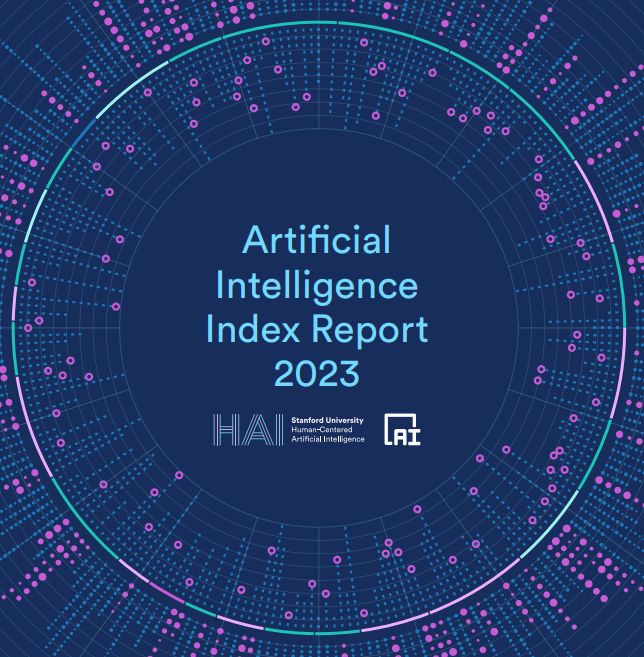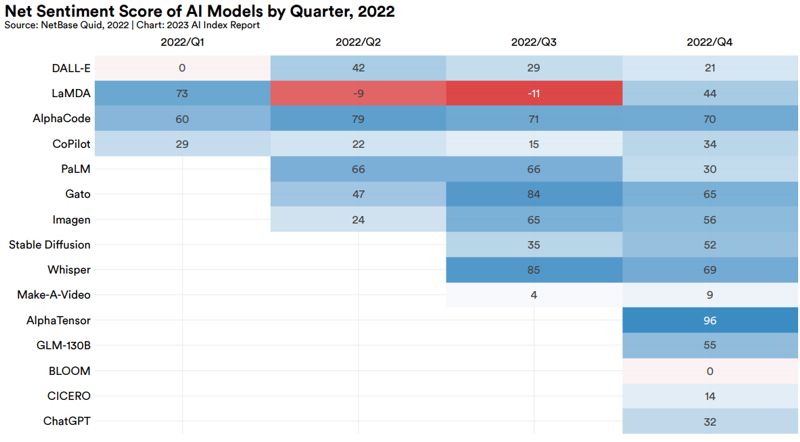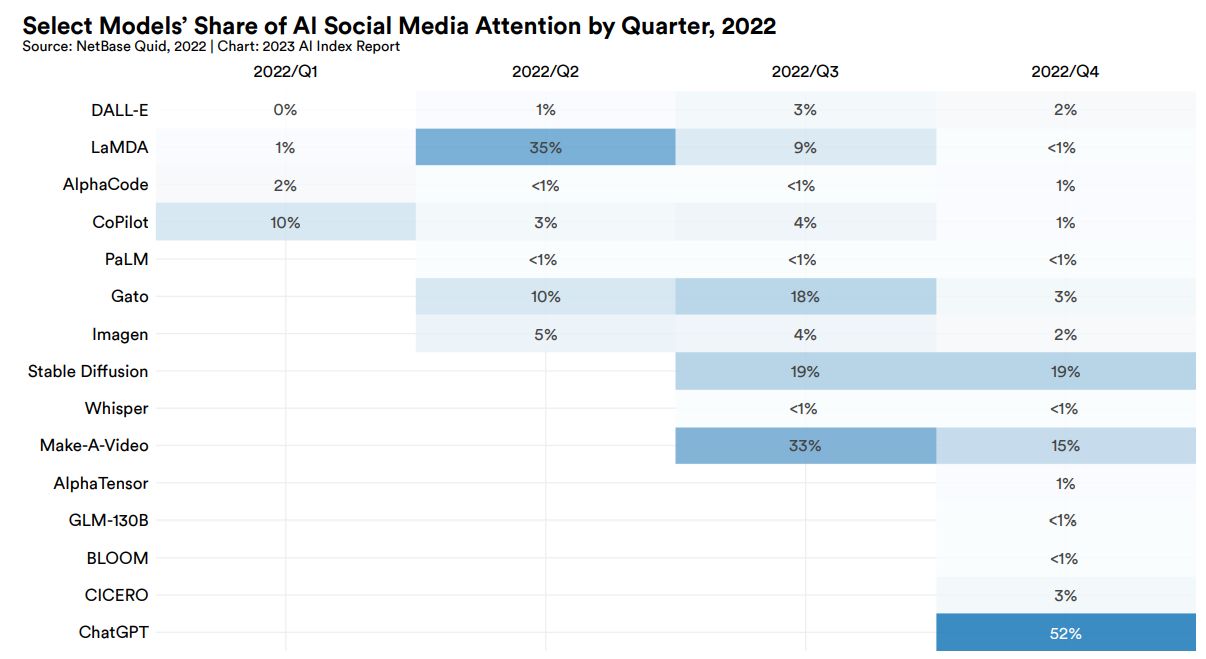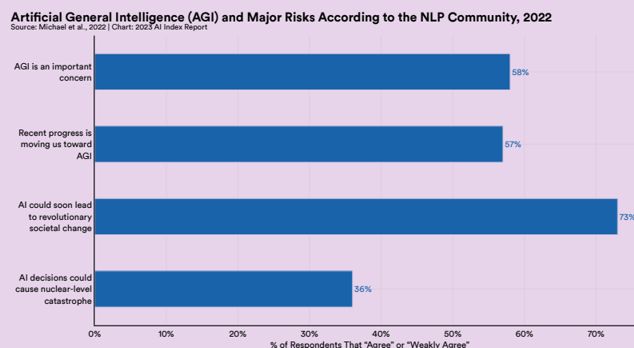| Gauging Sentiment Towards AI Models |
| Written by Janet Swift | |||
| Wednesday, 05 April 2023 | |||
|
In the week that eminent AI researchers sign a petition to halt further development of large language models a report from Stanford University shows that public attitudes towards AI models are largely positive, while NLP researchers tend to be more ambivalent. These findings are reported in the chapter on Public Opinion of the annual AI Index, from the Institute for Human-Centered Artificial Intelligence at Stanford University.
This is the 6th edition of an annual report collects, summarizes and visualizes data relating to artificial intelligence with the aim of enabling decision-makers to take meaningful action to advance AI responsibly and ethically with humans in mind. The AI Index is a massive undertaking and the 2023 report runs to almost 400 pages. As well as collecting data itself, HAI relies on data from external sources - in the case of the findings commented on here the NetBase Quid. The problem with the scale of its coverage of a fast moving technology, which AI certainly is at the moment, is that results from 12 months ago can already seem out-dated. However, ChatGTP is currently a trending "hot" topic and is what impelled me to start at the end of the report, with Chapter 8: Public Opinion, the second half of which looks at public attitudes towards emerging AI using social media data. As an additional twist NetBase Quid, which did this research, analyzed the data using AI-powered Natural Language Processing to perform sentiment analysis. Specifically the NetBase platform was used to analyze social conversation around AI models and their new releases from January to December 2022, looking at 2.74 million social media posts. The net sentiment score expresses the ratio of positive to negative sentiment around a given topic i.e. a net sentiment score of +100 would means that all conversation is positive whereas a score of -100 would mean that all conversation is negative and a score of 0 means that there is as much negative as positive attention paid to the AI Model. Commenting on this the AI Index Report states: AlphaCode had the most consistently high sentiment over time, as well as the highest average sentiment for 2022, due to positive press coverage on social media and practical use cases of AI-driven programming. During 2022, IProgrammer devoted two news items to AlphaCode, Deep Mind's AI designed to particpate in competetive programming. The first, Can DeepMind's Alpha Code Outperform Human Coders? published when AlphaCode debuted in Q1 reflected some positive sentiments from the DeepMind blog, together with some scepticism from Sue Gee who noticed a function defined within a for loop. In Q4 Mike James reported The Robots Are Coming - AlphaCode Can Program! and mentioned that AlphaCode had been the cover feature in the prestigious journal, Science. While the coverage in Science, which came from DeepMind painted a very positive picture, ours was tempered both by the threat it might pose to developer jobs. The only AI model to be awarded a negative sentiment score during 2022 was LaMDA - and we covered the, very widely reported, story to led to this unusual occurrence in Q2 when Blake Lemoine was suspended by Google for claiming that LaMDA, Language Model for Dialogue Applications, see Suspended For Claiming AI Is Sentient. Our follow-up Generating Sentences Is Not Evidence of Sentience reported that Lemoine had been sacked, again a news story that received a lot of attention, which included more negative than positive sentiment. So in interpreting the Net Sentiment Scores it is also important to take into account the volume of Social Media attention which is generally less than 1% to 3%:
So while, Alpha Tensor, again from Deep Mind, which had the most positive Sentiment score at 96% when it outperformed humans at matrix multiplication (see AI Beats 50 Year Old Best Multiplication Algorithm) only had a 1% shore of social media attention. On the other hand when ChatGPT was launched in 2022 Q4, with a sentiment score of 32 it claimed 52% share of media attention, way ahead of LaMDA's 35% in Q2. Currently ChatGPT is the focus of both media and social media attention and opinion is very divided as to the pros and cons of large language models in general. Matters have come to a head with a petition: Pause Giant AI Experiments: An Open Letter We call on all AI labs to immediately pause for at least 6 months the training of AI systems more powerful than It already has over 100,000 signatories, the first four being: Yoshua Bengio, Founder and Scientific Director at Mila, Turing Prize winner and professor at University of Montreal Stuart Russell, Berkeley, Professor of Computer Science, director of the Center for Intelligent Systems, and co-author of the standard textbook “Artificial Intelligence: a Modern Approach" Elon Musk, CEO of SpaceX, Tesla & Twitter Steve Wozniak, Co-founder, Apple If you find it surprising that this petition was initiated by leading luminaries in AI/Computing then the AI Index Report includes findings that the Natural Language Processing community has serious reservations about current research. Findings of a survey conducted in May/June 2022, with 480 respondents, 67% either agreed or weakly agreed with the statement "Most of NLP is dubious science". Asked about Artificial General Intelligence and Major Risks, 73% of respondents either agreed or weakly agreed that AI could soon lead to revolutionary societal change and 37% felt "AI decisions could cause nuclear-level catastrophe":
As the AI Index Report makes abundantly clear, AI has the potential to have a transformative impact on society and whether this will be for good or ill is far from clear. The pace of AI development has accelerated over recent months and we do seem to have been rushing headlong towards a goal that is ill-defined. So I'd go along with the idea of a temporary pause to take stock and there's a great deal more in this report that can contribute to the debate.
More InformationPause Giant AI Experiments: An Open Letter The AI Index Report - Measuring trends in Artificial Intelligence Related ArticlesChat GPT 4 - Still Not Telling The Whole Truth Google's Large Language Model Takes Control The Year of AI Breakthroughs 2022 To be informed about new articles on I Programmer, sign up for our weekly newsletter, subscribe to the RSS feed and follow us on Twitter, Facebook or Linkedin.
Comments
or email your comment to: comments@i-programmer.info |
|||
| Last Updated ( Wednesday, 05 April 2023 ) |





